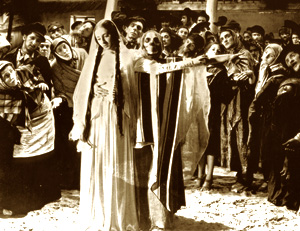 Religion in its essence is a medium by which individuals seek comfort and security. Its principles are supposed to serve as a framework in which ethical foundations are set. The benign aspects of religion can be numerous, however, religion is free from defects. Religion can easily diverge into its dark side which consists of cults, extremist, demonic possessions, and witchcraft. Folktales in particular, play an eminent role in disclosing the dark sides especially those that deal with demonic possessions A Jewish folktale for example, whose roots are trace back to the old testament of the Bible, revolves around a spirit known as Dybbuk. This spirit is known to linger in the world of the living because it is unable to rest in peace due to the sins it committed in the past. The lamenting soul would then cling itself into the body of an individual. By doing so, it completely takes possession over the body and its actions, with the only purpose of torturing the being it took over. It must be taken into consideration that this spirit, according to the folktale, is only able to take over a body of a sinner or someone who is not spiritual. The immense popularity over the concept of Dybbuk has enabled it to be adapted to the big screen by movies such as, The Possession, The Tenth Man, and The Unborn.
Religion in its essence is a medium by which individuals seek comfort and security. Its principles are supposed to serve as a framework in which ethical foundations are set. The benign aspects of religion can be numerous, however, religion is free from defects. Religion can easily diverge into its dark side which consists of cults, extremist, demonic possessions, and witchcraft. Folktales in particular, play an eminent role in disclosing the dark sides especially those that deal with demonic possessions A Jewish folktale for example, whose roots are trace back to the old testament of the Bible, revolves around a spirit known as Dybbuk. This spirit is known to linger in the world of the living because it is unable to rest in peace due to the sins it committed in the past. The lamenting soul would then cling itself into the body of an individual. By doing so, it completely takes possession over the body and its actions, with the only purpose of torturing the being it took over. It must be taken into consideration that this spirit, according to the folktale, is only able to take over a body of a sinner or someone who is not spiritual. The immense popularity over the concept of Dybbuk has enabled it to be adapted to the big screen by movies such as, The Possession, The Tenth Man, and The Unborn.
The idea of the wondering spirit itself isn’t so taunting what does make it taunting, in my perception, is the fact it lies under the spectrum of the religious taboo. It adds a certain kind of trill to know how thin the line can be between good and evil when it comes to religion. Throughout history most things that are related to darkness and evil have one way or another a certain influence of religious object. For example, churches that have a Gothic style serve as a place of worship, but at the same time they provoke a sense of horror because of its style. Similarly with angels that can be both painted as good creatures or as monsters. It is apparent that monsters and frightening things can derive and even be the creation of concepts that at one time were meant to only promote goodness such as religion itself. Is it even possible to create something monstrous out of something good?
Going back to Dybbuk, can it be considered a monster even if it is not tangible and when it is nothing else that a Folktale? Also, can the creators of it be considered the true monster?
